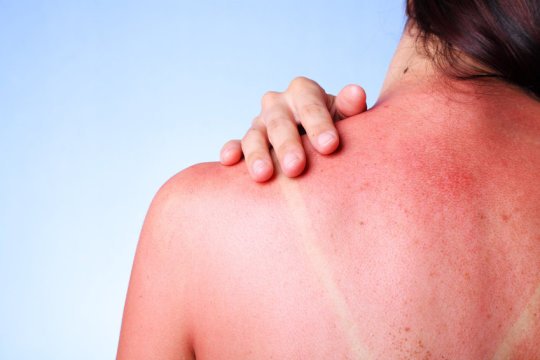 A high dosage of vitamin D after your next sunburn could mean the difference between weeks of agony and a quick recovery.
A high dosage of vitamin D after your next sunburn could mean the difference between weeks of agony and a quick recovery.
After exposing 20 participants to a small UV lamp sunburn on the inside of their arms, researchers from Case Western Reserve University in Ohio analyzed how vitamin D helped reduce inflammation. Kurt Lu, senior author and professor of Dermatology at the university and University Hospitals Cleveland Medical Center, said the results depended on the dose each participant was given.

“We found benefits from vitamin D were dose-dependent,” Lu said in a press release. “We hypothesize that vitamin D helps promote protective barriers in the skin by rapidly reducing inflammation. What we did not expect was that at a certain dose, vitamin D not only was capable of suppressing inflammation, it was also activating skin repair genes.”
The participants were given either a placebo pill or 50,000, 100,000 or 200,000 IU of vitamin D an hour after exposure to the UV lamp. Researchers checked in with the participants up to a week after the experiment and collected skin biopsies for further testing.
Related: Vitamin D Deficiency May Cause Early Menopause
“The diverse immunomodulatory effects of vitamin D are increasingly being recognized. However, the ability of oral vitamin D to modulate acute inflammation has not been recognized,” the researchers said.
Those who received the largest dose of vitamin D experienced reduced skin inflammation, less epidermal structural damage and reduced expression of pro-inflammatory markers within the skin two days after being exposed to the UV lamp. Participants who had the highest blood levels of vitamin D experienced reduced skin redness and increased gene activity associated with skin cell repair.
“The data may have broad implications for immunotherapeutic properties of vitamin D in skin homeostasis and implicate … regulation as a previously unreported mechanism by which vitamin D exerts anti-inflammatory effects in humans,” the researchers said.
Related: Scientists Create Topical Drug That Tans Skin
The participants were separated into two clusters based on similarities in their gene expression profiles and differed significantly in their vitamin D levels after treatment. Every individual’s response to vitamin D depended on his/her age, BMI, baseline vitamin D stores and genetic variations.
The researchers suggested that vitamin D has other additional benefits, such as reducing DNA damage. Since vitamin D is relatively cost-effective, the treatment could be used in the near future as an easy fix to sun-related skin damage.
“The simplicity and safety of high dose oral vitamin D treatment, combined with its rapid and sustained therapeutic efficacy, suggest that these proof-of-concept findings may ultimately be translated to routine clinical use once larger studies are performed on diverse populations of subjects,” the researchers said.
[“Source-vitalupdates”]
